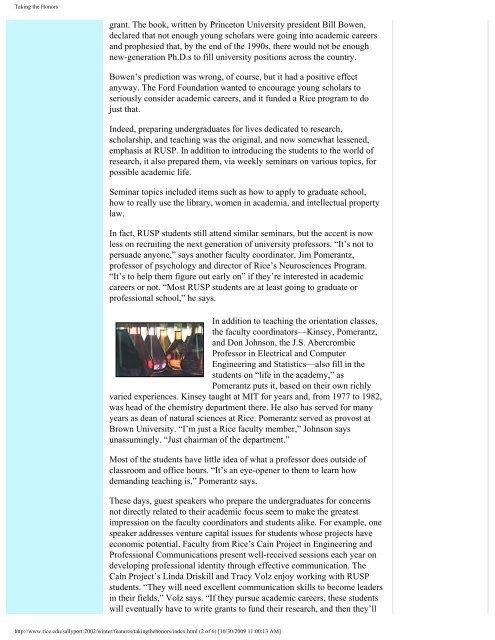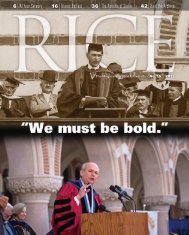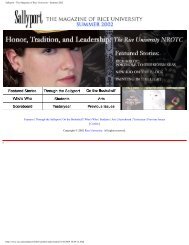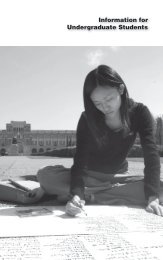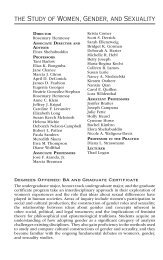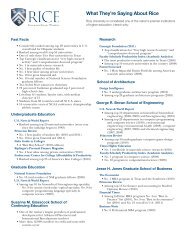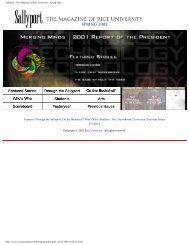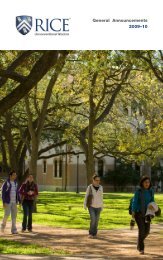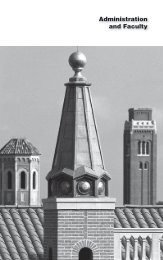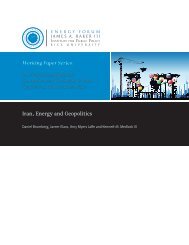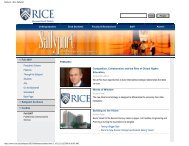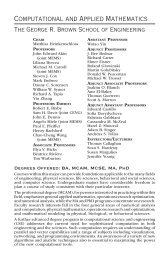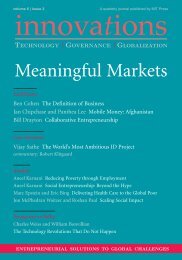Sallyport - The Magazine of Rice University - Winter 2002
Sallyport - The Magazine of Rice University - Winter 2002
Sallyport - The Magazine of Rice University - Winter 2002
Create successful ePaper yourself
Turn your PDF publications into a flip-book with our unique Google optimized e-Paper software.
Taking the Honors<br />
grant. <strong>The</strong> book, written by Princeton <strong>University</strong> president Bill Bowen,<br />
declared that not enough young scholars were going into academic careers<br />
and prophesied that, by the end <strong>of</strong> the 1990s, there would not be enough<br />
new-generation Ph.D.s to fill university positions across the country.<br />
Bowen’s prediction was wrong, <strong>of</strong> course, but it had a positive effect<br />
anyway. <strong>The</strong> Ford Foundation wanted to encourage young scholars to<br />
seriously consider academic careers, and it funded a <strong>Rice</strong> program to do<br />
just that.<br />
Indeed, preparing undergraduates for lives dedicated to research,<br />
scholarship, and teaching was the original, and now somewhat lessened,<br />
emphasis at RUSP. In addition to introducing the students to the world <strong>of</strong><br />
research, it also prepared them, via weekly seminars on various topics, for<br />
possible academic life.<br />
Seminar topics included items such as how to apply to graduate school,<br />
how to really use the library, women in academia, and intellectual property<br />
law.<br />
In fact, RUSP students still attend similar seminars, but the accent is now<br />
less on recruiting the next generation <strong>of</strong> university pr<strong>of</strong>essors. “It’s not to<br />
persuade anyone,” says another faculty coordinator, Jim Pomerantz,<br />
pr<strong>of</strong>essor <strong>of</strong> psychology and director <strong>of</strong> <strong>Rice</strong>’s Neurosciences Program.<br />
“It’s to help them figure out early on” if they’re interested in academic<br />
careers or not. “Most RUSP students are at least going to graduate or<br />
pr<strong>of</strong>essional school,” he says.<br />
In addition to teaching the orientation classes,<br />
the faculty coordinators—Kinsey, Pomerantz,<br />
and Don Johnson, the J.S. Abercrombie<br />
Pr<strong>of</strong>essor in Electrical and Computer<br />
Engineering and Statistics—also fill in the<br />
students on “life in the academy,” as<br />
Pomerantz puts it, based on their own richly<br />
varied experiences. Kinsey taught at MIT for years and, from 1977 to 1982,<br />
was head <strong>of</strong> the chemistry department there. He also has served for many<br />
years as dean <strong>of</strong> natural sciences at <strong>Rice</strong>. Pomerantz served as provost at<br />
Brown <strong>University</strong>. “I’m just a <strong>Rice</strong> faculty member,” Johnson says<br />
unassumingly. “Just chairman <strong>of</strong> the department.”<br />
Most <strong>of</strong> the students have little idea <strong>of</strong> what a pr<strong>of</strong>essor does outside <strong>of</strong><br />
classroom and <strong>of</strong>fice hours. “It’s an eye-opener to them to learn how<br />
demanding teaching is,” Pomerantz says.<br />
<strong>The</strong>se days, guest speakers who prepare the undergraduates for concerns<br />
not directly related to their academic focus seem to make the greatest<br />
impression on the faculty coordinators and students alike. For example, one<br />
speaker addresses venture capital issues for students whose projects have<br />
economic potential. Faculty from <strong>Rice</strong>’s Cain Project in Engineering and<br />
Pr<strong>of</strong>essional Communications present well-received sessions each year on<br />
developing pr<strong>of</strong>essional identity through effective communication. <strong>The</strong><br />
Cain Project’s Linda Driskill and Tracy Volz enjoy working with RUSP<br />
students. “<strong>The</strong>y will need excellent communication skills to become leaders<br />
in their fields,” Volz says. “If they pursue academic careers, these students<br />
will eventually have to write grants to fund their research, and then they’ll<br />
http://www.rice.edu/sallyport/<strong>2002</strong>/winter/features/takingthehonors/index.html (2 <strong>of</strong> 6) [10/30/2009 11:00:13 AM]


